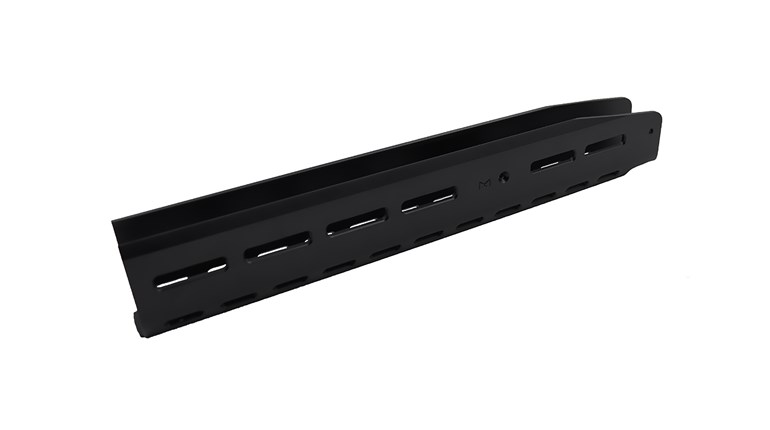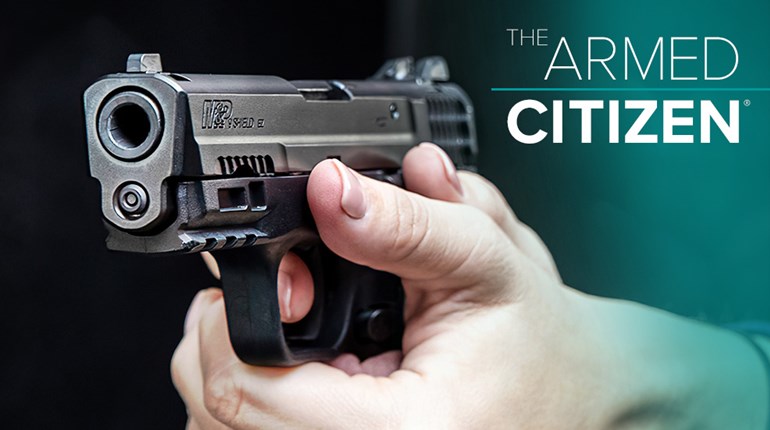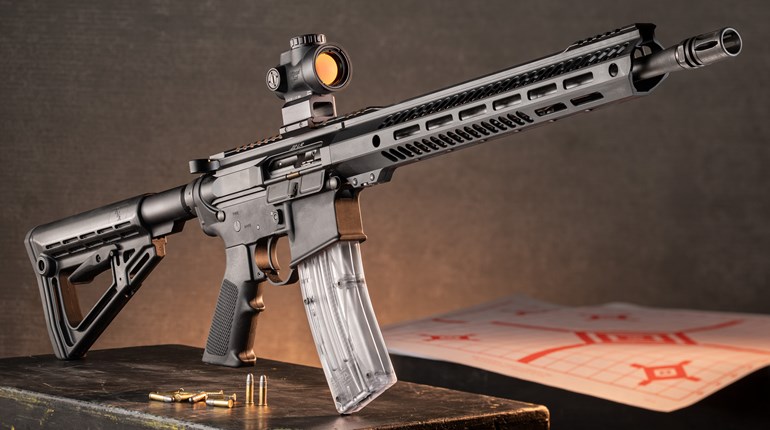
We’re back to our pistol caliber carbine (PCC) build in modest celebration. Some more major components have rolled in—barrels, mainly—and that’s when the compare/contrast can really start to get interesting.
Odin Works
We’re already fans of several Odin articles, having resorted to their bi-pod adapters and XGMR magazine releases as problem solvers (or performance improvers) before. Naturally, we were tickled when they agreed to send along a barrel.
And it’s turning out to be quite a barrel, too.

What they selected for our build is likely to be an “enough said” sort of affair. At 16.1 inches of gleaming 416 (stainless steel, that is), it’s tailor made for a non-SBR project, and avoids the delays that such paperwork processing may entail. If you’d like to be shooting your carbine in a few weeks or a month, in other words, stay away from anything shorter unless it’s “pinned and welded” like our benchmark JP GMR-13.
Latched onto our JoeBob/Spartan side-charging upper, however, we already have enough data to declare the Odin/Spartan/Lone Wolf combo a peach from the accuracy and reliability perspectives. Depending on what the course of fire looks like, we have three loads that constitute “go-tos” in PCC, but not all rifles will digest them, ranging as they do from .985 to 1.155 in OAL/COL. That short guy especially stops up some configurations, but not the Odin feeding from Glock magazines (though the chamber and barrel face are cut to run from Colt mag builds, too). First-approximation accuracy impressed with our 100-grain speed demon as well: Hand-held groups of five were routinely at an inch at 25 yards—about all our slightly vintage peepers can deliver with a red-dot.
In the finished example, we’ll run groups with a little magnification in the mix to see if we can improve, but so far, the 1:10 twist, button-rifled Odin is rocking.
Visit Odin Works at odinworks.com; MSRP on 16.1-inch 9mm barrels is $199.
Faxon Firearms Barrel
As it happens, we’ve also got a correctly papered SBR lower to work with, so we’re doing the old two-birds-with-one-stone trick. Our friends at Faxon Firearms stepped right up with a button-rifled 10.5-inch barrel in a 1.03-pound “taper” profile.

You may recall we’ve been impressed with these barrels before. While we’re generally not fans of light-nosed rifles, carbines are a somewhat different story: Their stock in trade is maneuverability and range expectations more modest than rifle calibers. With the Faxon on our upper, we’d call it superb in this regard.
The trick is proving to be getting triggers to behave as required on the blowback action. The rock-solid upper/lower fit we achieved here is an on-again, off-again affair in terms of taming all configurations. Mostly, it’s good, but as a matter of safety—and, oh yes, federal law—it’s a “gotta have.” Handily, friend of A1F and occasional contributor Tom “Hoser” Freeman is a comparative expert on such matters, and Timney (or here) is jumping to our aid in concert with his recommendation.
In the interim, our shorty Faxon is punching orderly holes much like the Odin, despite 5.5 inches less length. A target crown and button rifling are sure contributors to this excellent performance, especially considering the low ballistic coefficients of 9 mm projectiles. We grant that the essentially single-shot testing is slightly duller, but that will soon be mended.
The Faxon also gets us to a planning issue for your own build that will save trouble, time and money if you reckon with it on the, ahem, front end—muzzle treatment thread pitch. A slight majority of 9 mm comps/brakes and barrels feature ½ x 28 thread pitches, but this has the disadvantage of matching 5.56/.223 terminations. Consequently, the unpleasant possibility of putting a well sub-caliber device on a 9 mm barrel exists. We know stuffing .355/.356 projectiles through these has been tried—not by us, inadvertently or otherwise—but absolutely avoid this mismatch. It will wreck stuff, and can hurt people.
We borrow a good post assembly check on this from the “can” guys: Run a caliber-matched range rod through your comp/brake and bore. It should move freely but mostly wobble-free in the bore, and not touch comp/brake opening and baffles at all.
Visit Faxon Firearms at faxonfirearms.com; 10.5-inch 9 mm barrel is $129
Kaw Valley Precision
JoeBob Outfitters recommended the Kaw Valley Precision 8.5-inch barrel as a solution for testing the alternate (new?) thread pitch in 9 mm muzzle devices—½ x 36. It has quick-swinging promise along the lines of our other shorty, particularly with a lightweight profile. Like the others, the metal work and finish are first-rate all around.

The Kaw Valley arrived with an interesting adjunct we’re also looking forward to pitting against our other barrel termination solutions—a “linear” compensator. These aren’t too common anymore, but they were always interesting. Linear types still vent propulsive gases behind the departing projectile, but not as most do nowadays—upwards to reduce/eliminate muzzle climb, and left and right to slow rearward movement into the shooter’s shoulder.
Instead, they spread out the venting component of recoil over time as the principal method of softening and reducing roll, yaw and pitch. If you’re reading that as “ineffective,” reconsider: They drive along a very straight axis well suited to control via stock, grip and handguard, and their sideways concussion and noise effects are miniscule compared to others. That’s a very useful attribute if your carbine is to be deployed indoors in a defensive role.
We also have a suspicion these may be much more effective on carbines than might be expected, since blowback recoil impulse isn’t identical to rifle, and may be a fitter objective for linear-style mollification. Guess we’ll see!
Find Kaw Valley products at JoeBob Outfitters; 8.5 inch 9mm barrel is $109-139; Linear “XL” pistol caliber comp is $37-45.
Frank Winn has been studying arms and their relationship to tyranny, meaningful liberty and personal security all his adult life. He has been a firearms safety/shooting instructor for more than 20 years, and earned state, regional and national titles in several competitive disciplines.


































